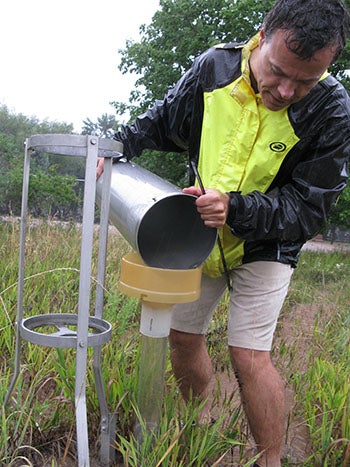Get a first-hand scoop on flash flooding
UCAR expert to deliver webinars on the science behind floods
May 7, 2014 - by Staff
May 7, 2014 - by Staff
May 7, 2014 | Flood waters are no abstraction to UCAR’s Matt Kelsch. As torrents cascaded through creeks and neighborhoods across the Front Range of Colorado last September, Kelsch slogged through ankle-deep water to officially measure the largest 24-hour rainfall in the history of Boulder: 9.08 inches. That’s nearly double the previous record.

Matt Kelsch measures the historic daily total of 9.08 inches at Boulder’s official station on September 12. A hydrometeorologist for UCAR’s Community Programs, Kelsch took the measurement as part of his regular volunteer duties with NOAA’s cooperative weather observing program. (Photo by Bob Henson, UCAR. This image is freely available for media & nonprofit use.)
The flooding, which caused an estimated $2 billion in damage, produced a stream of interviews and scientific inquiries for Kelsch. He’s a nationally recognized hydrometeorologist in UCAR’s COMET Program, which trains a wide range of specialists on environment-related science.
On May 20 and 21, Kelsch will present two webinars on the science behind flash flooding. The content is designed for people with some background in basic meteorology; the material is taught at a beginning undergraduate level but designed to interest a broad audience. Each webinar can be taken separately, and there are no specific prerequisites. The webinars are part of a new direction for COMET: offering pay-per-view content aimed at a broader audience than the program’s traditional clients (largely weather forecasters and other science professionals at government agencies in the United States and abroad).
“We’ve found widespread interest in the Colorado flooding and on flash floods in general,” says Kelsch. “We created the webinars to respond to that interest.” The webinars are also designed to help COMET test a cost-recovery model in which students in some courses pay tuition to offset the expense of course development.
Kelsch’s first hour-long webinar will examine the meteorology behind flash floods, including how forecasters watch for and diagnose the potential for major flood events. The second installment will explore where the water goes once it hits the ground, including runoff, land-use factors, and stream response.
Registration is $79 per webinar, or $129 for both.
The webinars were presented for the first time in March, but Kelsch is always ready to include recent material. “If a major U.S. flash flood happens between now and May 21, we’ll include it,” he says.
Along with years of teaching flood-related material, Kelsch has a close connection to weather in action, through his role as Boulder’s primary weather observer for NOAA and as one of the pioneer coordinators of the CoCoRaHS volunteer weather observing program. More than 10,000 people nationwide now collect daily rainfall totals for CoCoRaHS from their homes and workplaces, providing invaluable data on heavy rain and flood events.
Kelsch has joined colleagues at NCAR and Colorado State University to examine the Front Range flood in detail for an overview paper now in the works, coordinated by NCAR’s David Gochis. In his webinars, Kelsch will illustrate a conceptual model of flood evolution by drawing on a wide range of noteworthy U.S. flash floods over the last few years, including the 2013 Colorado disaster as well as examples from California, Kansas, Minnesota, Tennessee, and Virginia.
With strong interest from developing countries, COMET is pondering a follow-up set of flood webinars designed for regions with distinctly different needs and infrastructures. “Some of these areas have no weather radars and limited observation and forecast technologies,” says Kelsch.
In addition to webinars, COMET’s acclaimed MetEd website offers more than 750 hours of free online content that has drawn more than 330,000 registrants to date.
Writer/contact
Bob Henson, NCAR & UCAR Communications
Lead scientists
Matt Kelsch, UCAR/COMET
Elizabeth Page, UCAR/COMET
Find out more
Registration details for May 20 and 21 webinars
MetEd: Teaching and Training Resources for the Geoscience Community